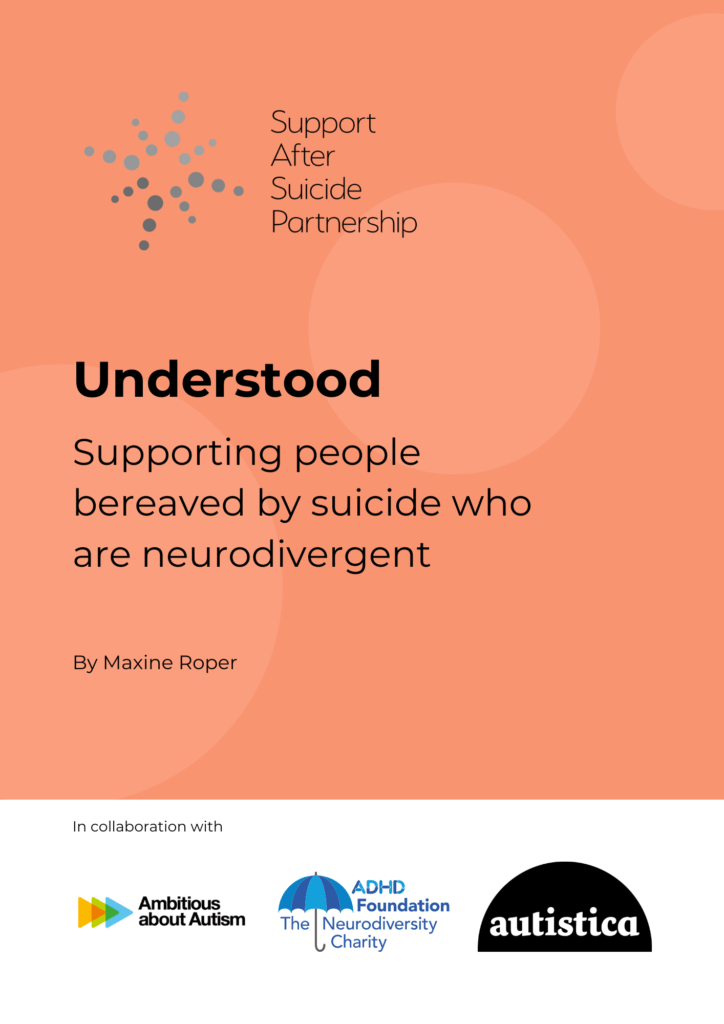14 March 2024 | News
At Support After Suicide Partnership (SASP), we work with our members to identify areas where new or additional guidance for suicide bereavement services is needed. This ensures we work towards our mission: that everyone bereaved by suicide is offered timely and appropriate support.
One such area is how to best support people who are neurodivergent and have suffered a bereavement by suicide.
Being neurodivergent can have a huge impact on people’s daily life. A lack of accurate understanding about neurodivergence means it is often unrecognised and unsupported. Common co-occurring health conditions can also make neurodivergence harder to recognise, or add to challenges.
Neurodivergent people are more likely to lack support, have relationships which aren’t recognised by others, or react to events in ways that are less well understood, which can add to the impact of a bereavement.
So, we have created this guide which includes information on how people who are neurodivergent may react to a bereavement, key barriers being faced to accessing support, and guidance for services.
Key to its creation was working closely with both expert services – ADHD Foundation, Autistica and Ambitious About Autism – and experts by experience from National Suicide Prevention Alliance (NSPA)’s lived experience network.
Neurodivergent writer, Maxine Roper, also joined us to lead the working group and write the guide. The working group attended roundtable meetings and reviewed iterations of the guide to get to where it is today. We hope to make a real difference to the support those who are neurodivergent receive.
What do we mean by neurodiversity?
Neurodivergence is used as an umbrella term for a group of neurological differences which affect how someone experiences the world, including autism, ADHD, dyslexia, dyspraxia, dyscalculia and Tourette’s Syndrome.
There are also uncertainties around how different types of neurodivergence are related to each other. This is why we tend to use the umbrella term ‘neurodivergent’ rather than refer to different types. Many neurodivergent people identify with a single diagnosis (such as “I’m autistic,” “I have ADHD” or “I’m dyslexic”). Some may refer to themselves as neurodivergent, or multiply neurodivergent.
Neurodivergence and learning disabilities are different but can occur alongside each other. A number of other conditions are common alongside autism and ADHD, including Obsessive Compulsive Disorder, eating disorders, bipolar disorder, epilepsy, menstrual problems and gastrointestinal conditions.
Key recommendations for services
Practical support
- Offer people a variety of different ways to communicate with your service.
- Let people lead on what would help them but know when to make suggestions.
- Offer support with ‘grief admin’ such as form-filling, arrangements and navigating inquests.
- Be mindful that common coping strategies may not help some neurodivergent people.
- Expect that neurodivergent people might read from or take notes to help them during counselling or support sessions.
Emotional support
- Support people to grieve in their own way.
- Provide clear boundaries in a group setting.
- Be aware that someone might take things that are said to them very literally or react very intensely.
- Be patient when asking questions, especially hypothetical questions. A neurodivergent person might not understand the reason for questions or be able to answer questions effectively.
- At times, giving direct advice may be appropriate to prevent harm to themselves or other people. A neurodivergent person might struggle to quickly place themselves in a hypothetical situation, especially one that might make them more anxious.
- Support people to maintain relationships with others following the loss.
- Understand that a neurodivergent person might be or have been in seemingly unhealthy or chaotic relationships.
- If a bereaved neurodivergent person thinks or knows that the person who died was neurodivergent, let them explore this in a way which helps them.
- Ensure a joined-up approach to support with a willingness to signpost people elsewhere in addition to your service.


